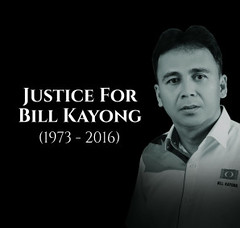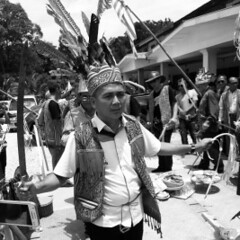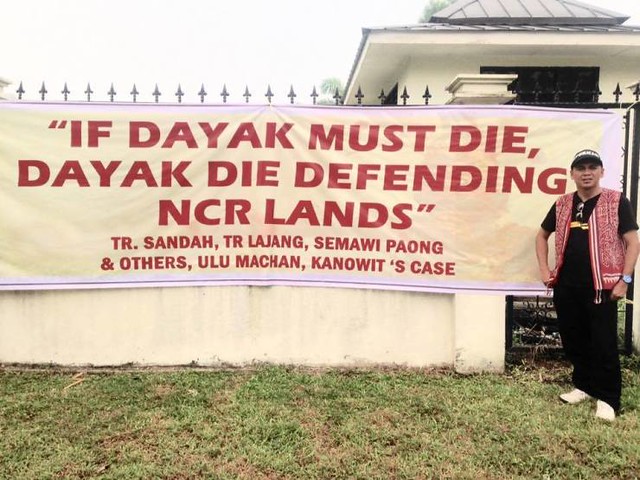http://e-info.org.tw/node/116645
反水壩捍衛原民權益 大馬國會議員特助遭槍殺
文字大小
60 1 Share2
作者:烏舜安咿(達邦樹 • 無聲的吶喊)
※編按:對環境運動人士來說,去(2015)年可說是動噩耗頻傳。根據人權組織「全球見證」(Global Witness)上週發表的最新研究統計,去年平均每一週,就有三名為土地、森林、河流挺身而出,抵抗企業破壞的環保人士從世界上消失。這個數字比前(2014)年成長了60%,更是全球見證有紀錄以來的最高點。而今年,就在這個月,又有一名反水壩運動人士遭射殺,地點就在離台灣不遠的馬來西亞。
長期致力於捍衛原住民權益的沙勞越(Sarawak)社運成員比爾卡勇(Bill Kayong),於6月21日在前往辦公室途中,遭不明人士開槍射殺,當場斃命。
 |
| 比爾卡勇(Bill Kayong)。圖片來源:達邦樹 • 無聲的吶喊。 |
警方表示,當時比爾駕駛其四輪驅動車在交通燈前等候,該時段是交通繁忙的時候,因此相信不少人目睹事發經過,並呼籲目擊者提供線索。
比爾被謀殺的事件傳遍美里、社運界和政治界,眾人皆無法置信、紛紛感到震驚。儘管警方呼籲眾人勿揣測比爾遇害的原因,但不少人認為與捍衛原住民土地權益有關。
43歲的比爾是美里國會議員張有慶的特別助理,他也在2014年9月份,與志同道合的朋友一同組織沙勞越達雅人協會(Sarawak Dayak Association,Pedas),旨為達雅人捍衛權益,而他也被推選為秘書。
沙勞越達雅人協會主席科林英然(Colin Imran)向媒體透露,「比爾曾告知在去年接到陌生人來電,叫比爾不要干涉土地事宜,但我不知道那是要挾或否,比爾沒有多說,因為他不喜歡小題大作。」
比爾為人親切,這是在朋友圈子都熟悉的他。無論是社運分子、政黨領袖或是普通百姓,凡認識比爾的都會說,比爾對公義抱著最大的熱忱,凡見到不公不義的事情都會站出來發聲。
 |
| 比爾捍衛原住民權益不遺餘力。圖片來源:達邦樹 • 無聲的吶喊。 |
比爾是一個敢怒敢言、不畏懼強權、勇於為不公不義請願的社運分子。儘管身為政治助理的工作已是極為忙碌,但他仍善用每一寸空隙,為權益受到剝削的原住民奔波忙碌,如到長屋現場與伐木流氓對峙、向警方施壓調查相關案件、召開記者會甚至率眾走上街頭要社會大眾一同關注原住民議題。
此外,他也是《Radio Free Sarawak》的支持者。儘管該自由電台面對砂州政府的打壓和監督,但比爾卻認為那是傳達原住民議題的重要平台,因此每當有相關議題需要比爾提供資訊或意見,他必義不容辭的接受訪問。
最近也是最後一次的訪問在今年4月7日。比爾向《Radio Free Sarawak》表示,警方否認在Bekelit長屋對村民拔槍示警。「雖然警方否認,但我們卻在現場錄下警方要挾村民的對話內容,如今我們要求警方向村民道歉。」
其能力更是獲得認可而被推選為人民公正黨的代表,出征砂州選,成為柏戈奴(Bekenu)的候選人。
峇南內陸反水壩社運分子Caroline在得知比爾遇害後,在臉書撰寫以下悼文:
「感謝你在我需要支持的時候陪我走過難熬的日子;感謝你在我需要引導的時候帶領我往前走;感謝你在我往前衝的時候緊隨我後方,為我善後。請安息我至親的朋友和戰友。」
比爾遇害後,臉書上掀起一片哀悼比爾的浪潮,其中一張被廣傳的照片更彰顯了比爾的正義之心。
2015年10月16日比爾在其臉書上傳一張照片,圖中的布條寫道:「若達雅人必死,必因捍衛習俗地而死。」(If Dayak must die,Dayak die defending NCR land)。圖片來源:達邦樹 • 無聲的吶喊。
2015年10月16日比爾在其臉書上傳一張照片,圖中的布條寫道:「若達雅人必死,必因捍衛習俗地而死。」(If Dayak must die,Dayak die defending NCR land)。
比爾當時在上傳此圖後,寫道:
「在布魯克王朝的時代,布魯克贊成也承認原住民的習俗地權益,原住民習俗地可用作種植、取木、取食材和墓地,因此現今的掌權者請勿隨意逮捕對付捍衛土地權益的原住民。我們看到現今政府過於貪婪,不為原住民所著想。更發租貸執照(Provisional Lease,PL)給財團企業以趁機侵占原住民土地,從中牟利。就如全球見證發布的影片中,我們的部長是如何掠奪沙勞越原住民土地。因此我們必須捍守土地,別被有關當局利用並協助首長越來越富裕,將錢帶到美國、加拿大和澳洲的公司。」
Record Number Of Environmentalists Killed Last Year For Defending The Planet
On average, more than three were killed per week, a watchdog group found.
ANTARA PHOTO AGENCY/REUTERS
For those tasked with the protection of our planet, 2015 was a year steeped in blood.
At least 185 land and environmental defenders, those who take peaceful action to protect natural resources, were killed in 2015, according to a new report released Monday. Those figures, the highest ever documented by the watchdog group Global Witness, represent a stark increase of nearly 60 percent from just a year earlier and an average death rate of more than three people per week.
“The environment is emerging as a new battleground for human rights,” the report, “On Dangerous Ground,” reads.
More than half of those killed came from just three countries, Brazil had 50 deaths, the Philippines, 33, and Colombia, 26. All are home to fierce battles between indigenous residents and corporations engaged in environment-harming enterprises like logging, mining and the expansion of plantations.
GLOBAL WITNESS
“What we’re seeing is an increasing scramble for environmental prizes,” Billy Kyte, campaign leader for Global Witness, told The Huffington Post earlier this year. “Corporations are entering more remote areas where they get more bang for their buck, and they’re encroaching on indigenous land.”
Mining enterprises have been linked to at least 42 of these deaths, agriculture and logging another 20 and 15, respectively. The report found indigenous groups were particularly vulnerable to violence, accounting for 40 percent of those killed last year.
While the number of activists killed has increased since last year, the report notes the official 185 figure represents only reported deaths. The actual figure is likely “far higher,” the paper notes, citing war-torn regions in Africa and South Asia that have little oversight but likely violent political retribution over environmental advocacy.
Sadly, even the reported deaths often go uninvestigated and unpunished, according to the report, which chronicles the shooting of two prominent advocates in the Philippines. Filipino activist Michelle Campos saw both her father and grandfather, fierce opponents of encroaching mining interests, killed in front of their family by paramilitary groups linked to the military.
AARON FAVILA/ASSOCIATED PRESS
“They told us to leave our community in two days or else they will finish us all,” Campos wrote in a letter published by The Philippine Reporter. “They killed Onel, my father and our chairperson. They shot him in the head in front of our community, in front of my three younger siblings.”
About 3,000 people were forced to leave their homes following the incident, and although several suspects have been identified, no arrests have been made.
Campos’ story is a common narrative around the world. Other examples include the death of a Guatemalan teacher who helped close a palm oil plantation and theshooting of a land defender in Myanmar.
The report also comes just months after the death of Berta Cáceres, a high-profile environmentalist who for decades worked to defend indigenous land rights in Honduras. That country was the deadliest in which to conduct such work from 2010 to 2015, though it ranked eighth in 2015 alone. Cáceres, a winner of the prestigious Goldman Environmental Prize for grassroots activism, was gunned down in her home after receiving death threats for years.
In her speech last year upon receiving the Goldman Prize, Cáceres called on humanity to act on the urgent need for protection. She dedicated the award to those “who gave their lives in the struggle to defend our natural resources.”
“Let us wake up. Let us wake up, humankind,” she said. “We’re out of time.”


沒有留言:
張貼留言